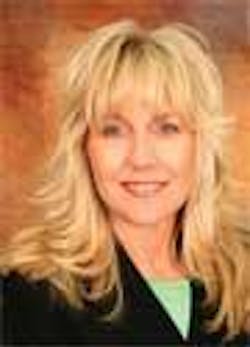Public health enthusiast
by Christine Nathe, RDH, MS
[email protected]
This month’s public health spotlight is on a new dental hygienist, Elmer Gonzalez, who began his public health career immediately after graduation in a clinic that serves patients with developmental disabilities. Before becoming a dental hygienist, he worked as an aide for those with developmental disabilities. He’s pursuing his graduate degree in dental hygiene, and was recently selected to attend a premier workshop for those who treat patients with developmental disabilities.
Why did you decide to go into dental hygiene?
I became very interested in dental hygiene while I was working at a group home in Albuquerque. I encountered many oral health problems in people with disabilities, such as poor oral hygiene, bad breath, dry mouth, and more. Their oral conditions opened my eyes to a new world. I felt the need to help them, but unfortunately there wasn’t much I could do other than try to brush their teeth to the best of my ability. I was an undergraduate at the University of New Mexico pursuing a degree in Spanish and psychology. My cousin was an undergraduate at the same time and was pursuing a degree in dental hygiene. Dental hygiene sounded interesting, so I started taking prerequisites for it. It was the tool I was looking for to better help people with disabilities.
How did you get into dental public health? Did you need additional education?
When I began the dental hygiene program, I was interested in becoming a public health hygienist, particularly to serve people with developmental disabilities or any other underserved area. In school I did an internship at Carrie Tingley Hospital Dental Clinic (CTHDC), serving children and adults with special needs. The internship was a wonderful experience and my desire to serve a special population increased. After graduating from UNM, I was offered a dental hygiene position at the clinic.
As a public health hygienist, I wanted to pursue higher education in order to make a greater impact and to advocate for people with disabilities. I was admitted to the master’s program in dental hygiene at UNM. By joining the master’s program I was able to get interdisciplinary training at the New Mexico LEND (Leadership Education in Neurodevelopmental Disabilities) program, which is part of the Center for Development and Disability (CDD) at the UNM School of Medicine Pediatrics. I’m also getting a certificate in developmental disabilities.
What are your current positions?
I am the dental hygienist at CTHDC. I teach in the junior clinic and also teach students who rotate through my clinic.
Can you discuss any particularly interesting experiences you’ve had in your dental public health positions?
Working as a public health hygienist is challenging both physically and mentally. But the rewards I receive after each patient goes home in a better oral health condition gives me strength to keep going.
The best reward and experience I’ve gotten at CTHDC is treating those patients that are very challenging to provide care for, and who struggle in every step of the treatment process. I’m talking about those that scream obscenities when I ask them to open their mouths, and move their heads from side to side so that I can’t get the instrument in their mouths, yet they give me a hug, apologize, and thank me when I finish.
What advice would you give hygienists thinking of doing something different?
There are hygienists interested only in the private practice environment; however, if a hygienist would like to experience something new, I would encourage them to face the challenges as they come and never give up their dream to be the hygienist they’ve always wanted to be. There is no doubt that knowledge is a powerful tool to accomplish a goal. Goals are sometimes remote thoughts, but they’re there and it takes perseverance, dedication, education, and lots of passion and hard work to transform them into reality.
About the Author
Christine Nathe, RDH, MS, is a professor and graduate program director at the University of Neaw Mexico, Division of Dental Hygiene, in Albuquerque. She is also the author of “Dental Public Health” (www.prenhall.com/nathe), which is in its second edition with Prentice Hall. She can be reached at [email protected] or (505) 272-8147.


